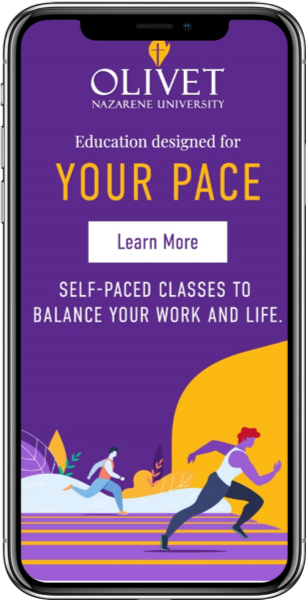A tech-powered free tuition plan soars degree completion rates
Olivet Nazarene University's digital campus is democratizing education

The 2019 report Some College, No Degree, from the National Student Clearinghouse Research Center, was a sobering reminder that in higher education, many students get left behind. One-third of those who enroll every year drop out before earning a degree or certificate, for a current total of 36 million Americans, by NSC’s count.
“Imagine how far America could advance its attainment goals,” the report’s authors stated, “if states and colleges and universities, informed by the evidence from this report, actually tried to re-enroll students from the 36 million current Some College, No Degree population, reaching out with tailored programs and policies to meet their needs.”
The report did not speculate on what those programs and policies might look like, but Olivet Nazarene University in Bourbonnais, Illinois, blazed a trail with a bold initiative: Your Way, an online program, built with Salesforce.org Education Cloud, in which adult students can complete general-education courses with no upfront costs. No tuition, no books purchases, no fees, no strings. The only cost is for official transcripts, at just $50 per credit hour.
When ONU announced Your Way in January, its Facebook post reached more than 800,000 people in 24 hours. Over the next few months, enrollment in ONU’s undergraduate degree completion programs increased more than 1,000 percent.
“Our goal was to create a differentiator,” says Ryan Spittal, vice president for ONU Global, which houses the School of Graduate and Continuing Studies. “Whenever you take a chance like that and reformulate a system, retool how you approach something, it’s a risk. We are so pleased to look at a more modern approach to higher education and meeting the needs of the audiences we serve.”

Ryan Spittal, vice president for ONU Global
Ryan Spittal, vice president for ONU Global
At the time the Some College, No Degree report was released, ONU Global was beginning work on a new five-year strategic plan. The goal of the plan was to help create scale so that ONU Global could serve their students in a more impactful way. “We believe that technology innovation is key to help schools our size automate, create efficiencies, and build scale to serve our students better,” he explains.
So when Kathy Lueckeman, chief strategy officer, pitched the idea of tuition-free classes, as a way to bring some from the Some College, No Degree population back into higher education, he was intrigued. The team then spent months gaming it out. Knowing that a deep discount on traditional online courses would not move the needle, they worked with the flipped classroom model, in which students engage with new material on their own time, and class time is used for discussion, not lecture.
“For instructors, it’s going back to what’s wonderful about teaching, engaging with the students and expanding their knowledge,” says Lueckeman. “And students can engage in a way that makes sense to them. It’s low risk because there are no upfront costs, and it gives them an opportunity to get that muscle memory back — taking courses, learning, engaging with faculty and other students, writing and reading, and building those problem-solving skills.
“We automated the MQL (marketing qualified lead) process, a practice you don't hear used in higher ed very often, to cut administrative costs and speed processes,” she continues. “Then, we took those thousands of people who say, ‘Yeah, I might be interested,’ and we give them a ‘try before you buy’ experience, a kind of subscription experience, so they can engage with our product. That develops them as a student, sets them up for success, so we can retain them for their degree or credential attainment. So, instead of spending our time at the top of the enrollment funnel, where all the resources have been in higher ed for decades, we spend our time on student success.”
But the logistics of providing this experience were daunting. ONU Global was already using Salesforce for marketing and recruitment, and its Trailhead online learning platform proved to be uniquely suited for ONU’s ambitious plans.
“Could we do it without Salesforce? I don’t believe so,” says Andrew Hasik, chief technology officer. “I’ve seen the other solutions. I got a firsthand look at them for over a decade. Salesforce is different. We needed something that can scale and that offered automation. With the technology stack within Salesforce, we assign permission sets, quickly give new students access, deliver all the course materials, and provide us with all the analytics — I’ve never seen anything that connected in my professional experience.”

Andrew Hasik, chief technology officer, ONU
Andrew Hasik, chief technology officer, ONU
“To bend the cost curve for students,” Spittal adds, “we had to bend the cost curve for ourselves. But we didn’t want to sacrifice quality. Salesforce helped us reimagine our systems and how we do things so that we can educate at scale.”
Scale includes offering credentialing programs, in addition to the general education courses. Your Way already offers the Salesforce Pathways micro-credential, which recognizes experience in Salesforce and confers academic credit. Adults who hold a bachelor’s degree and have earned a Salesforce Certification or achieved Trailhead Ranger status can receive this new credential at no charge when earning a graduate certificate. Spittal is in conversation with other regional and national companies about partnering with ONU Global to develop their own credentialing programs for new and existing employees.
To date since implementing Salesforce, ONU has reduced the cost of recruitment by 30% and has seen an 1000% increase in new students.
“Your Way is a lot more than just tuition-free courses,” Hasik says. “The system behind it is a mechanism for us to build multiple pathways that lead to practical outcomes. And I think that's more what people are looking for from college. People want to learn, now more than ever, but they’re rejecting the idea that it has to be on higher ed’s terms.”

There’s another important lesson for institutions, especially small ones, in ONU’s experiment, Hasik says.
“A lot of people in our industry get hung up on the idea that if they only had more money, if they only had more resources, they could overcome their challenges,” he explains. “I don't believe that. ‘More’ does not allow for innovation, I think it’s ‘less’ that promotes innovation. And if we're being honest, higher ed is behind the innovation pace of other industries. But when you think of it that way, there's nothing holding us back. The technology is there, the partnerships are there, everything you need is there.”
“Having that technology stack behind us is liberating,” adds Lueckeman. “Using Salesforce to develop a holistic solution for recruitment, admissions, advising, course delivery, and a digital campus allows us to use best-in-class technology to personalize the student experience. Importantly, we can leverage the platform for student information and learning management system data, so we can automate tedious processes and ensure we have robust analytics. If a small, private institution like Olivet can do this, with help from some great partners, that’s very democratizing and makes us competitive with market leaders.”



